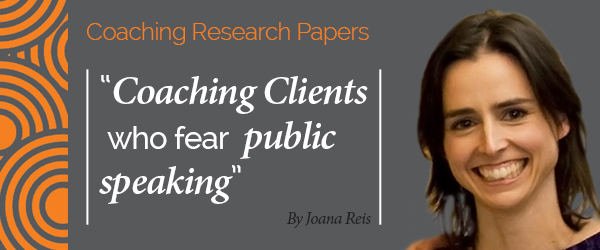 Research Paper By Joana Reis
Research Paper By Joana Reis
(Life Purpose Coach, PORTUGAL)
1. Introduction
Fear of public speaking is one of the most common fears that people recognize to have and it can affect their lives in many ways. It is a social type of fear and it is also called as glossophobia, which is its technical name. A Sunday Times research study of 3000 people as found that 41% report fear of speaking in front of others as their number one anxiety before even death (Thomas, 2006). The purpose of this paper is to give a structure that coaches can follow through to help their clients manage this fear.
2. Understanding Fear of Public Speaking
2.1. Origins of Fear
Spijck (2011) states that fear is a fact and a very natural reaction to a threatening situation. From the beginning, fear, just like pain, has been an alarm signal of great importance for the survival of the human race.
According to Spijck (2011) there can be ingrained and acquired fears. The first type is typically associated with responses to dangerous situations. The second kind derives from thoughts and perspectives that are built and usually is based on ingrained fears.
Another fear classification is brought by Spijck (2011), exposing that both ingrained and acquired fears can be real, meaning that the object of fear presents actual danger, and can also be irrational: being afraid of something that lack of real threat. Even a real fear can take irrational proportions if the danger level of the situation is overestimated.
So, fear can be a very useful feeling that is inbuilt in all beings. It gives that extra energy that the body needs to protect itself in risky situations. Fear only becomes unhelpful when it is acquired and based on irrational perceptions. So, what is there to change is the perception of the situation and the belief that is not supporting the desired actions and results. Most of the situations that people with public speaking phobia fear are essentially imaginary and not dangerous at all. Usually, the worries that people spot when it comes to public speaking are essentially related with fear of criticism and fear of failure.
The only thing we have to fear is fear itself. (Franklin D. Roosevelt)
FEAR – False Evidence Appearing Real (unknown origin)
2.2. Main Beliefs That Lie Behind This Fear
Indeed, every fear is caused by a belief, a thought that origins the feeling of fear. So, in order to understand and overcome this limiting feeling, it is needed to “follow the stream of the feeling” and understand in what belief it is rooted.
The most common beliefs that lie behind the fear of public speaking are created by society that plays a significant role in influencing the individual. Jones (2005) comments that, this is what psychologists would call a social construction. The fact that many people say public speaking is frightening means this causes others to be fearful of it as well.
Besides that, according to Jones (2005), another reason we are frequently frightened of things is because we lack exposure to them. The more we experience things, the less we fear them. Taking action will help fear go away.
The belief system tends to prove itself. So, the beliefs people hold tend to really happen. As Thomas (2006) argues once you have made your initial self-assessment based on your assumptions about public speaking, you then decide if you are truly capable of giving a good public speech. The answer to this question guides the outcome of your experience.
2.3. Manifestation of Fear in the Human Body
In order to really understand what it is happening while experiencing fear, it is needed to look into what is being experienced within the body when feelings and beliefs are being hold.
Jones (2005) points out that, all fears lead to the production of hormones designed to help survival. Hormones associated with fear are called cortisol and adrenaline which are responsible for making energy and blood supplies available for use. The way the hormonal balance of the body returns to normal in a real threat situation is by the production of hormones that counter adrenaline and cortisol and the principal stimulus for its production is muscular activity. So, getting some physical exercise in the hour or so before speaking can be a good help for a successful speech.
Arntz W., Chasse B. and Vicente M. (2005) explain that, in the brain, the places where nerve cells connect are related with a thought or a memory. If the thought process is interrupted, those nerve cells that are connected start breaking their long term relationship. This means that people are able to rebuilt brain connections in the way it will empower them most.
According to Arntz W., Chasse B. and Vicente M. (2005) in the moment that we experience an emotional state there is a chemical that matches it and that is immediately released to the blood stream. Every single cell in the body has receptors where these chemicals attach, changing the cell in many ways. Therefore, each cell has a consciousness. There is always the perspective of the cell. So, people create situations in their lives that will fulfill the biochemical craving of their cells.